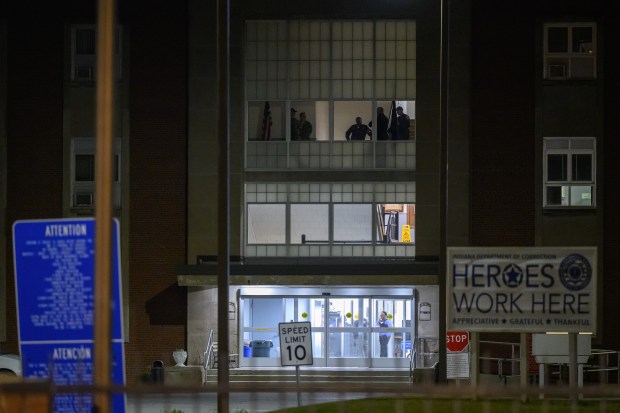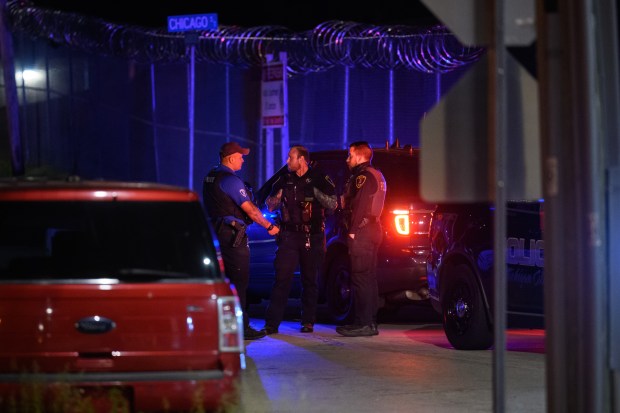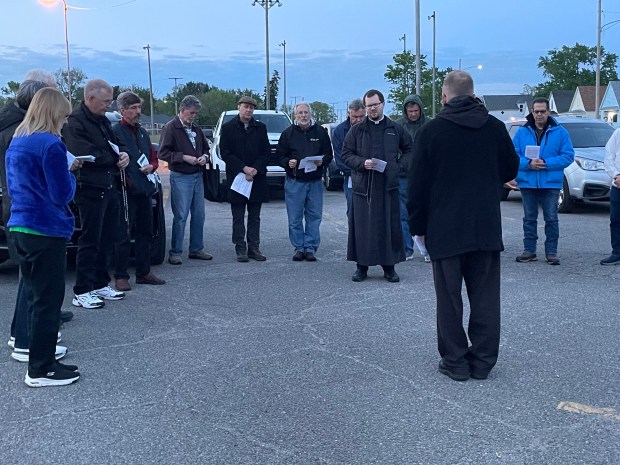A small group, most wearing light jackets in the chilly May evening, gathered in prayer outside the Indiana State Prison in Michigan City Monday night just hours before Benjamin Ritchie was executed by lethal injection.
Diocese of Gary Rev. Richard Holy, the diocese’s director of pro-life activities, led the vigil of around a dozen people to pray for the end of the death penalty, for lawyers who help inmates on death row, and the prison workers who administer the execution.
The group also prayed for the family of Beech Grove Police Officer Bill Toney, who Ritchie fatally shot nearly 25 years ago. Holy said Monday night was likely “an evening of closure” for Toney’s family, as well as a difficult night for them.
“We don’t need to take more life in order to protect society,” Holy said. “People on death row can serve out life in prison, and that’s absolutely no picnic. They are paying for their crime everyday.”
Ritchie, 45, had been on Indiana’s death row since 2002, when he was convicted of killing Toney during a foot chase. Ritchie was executed shortly after midnight Tuesday in the state’s second execution in just over five months.
Ritchie was executed at the Indiana State Prison in Michigan City, according to Indiana Department of Correction officials, in a process that started shortly after midnight Tuesday. Ritchie was pronounced dead at 12:46 a.m.
Ritchie’s last meal was the Tour of Italy from Olive Garden, according to the IDOC statement. His last words were: “I love my family, my friends and all the support I’ve gotten. I hope they all find peace.”
Under state law, he was allowed five witnesses at his execution, which included his attorney Steve Schutte, who told reporters he had a limited view of the process.
“I couldn’t see his face. He was lying flat by that time,” Schutte said. “He sat up, twitched, laid back down.”
During his clemency hearing on May 5, Ritchie said that on Sept. 29, 2000, he was with a group of guys and they stole a car from a gas station with the goal of reselling its rims. Ritchie, who was 20 years old and on court supervision at the time, said when police officers pulled up behind them it felt like “everything sped up.”

“It’s like if you had a fast-forward button on a movie and you hit the button. Everything sped out of control so fast,” Ritchie said.
Ritchie said he shouldn’t have stolen a car or had a gun that night. When the officers arrived, Ritchie said he should’ve just got out of the car and accepted the consequences.
“That night was … a train that left the station with no breaks,” Ritchie said. “Multiple bad decisions led to losing the life of a man who should be here today.”

In referencing his behavior during his sentencing, Ritchie said he shouldn’t have been rude to Toney’s wife.
“I had no business mouthing off to that lady,” Ritchie said. “She had every right to say what she wanted to say to me.”
Killing Toney was a “horrible” decision, Ritchie said, but Toney’s memory “could best be served” with Ritchie spending the rest of his life in jail offering support to other inmates.
During a public hearing May 12, Toney’s wife Dee Dee Horen addressed the board and told them Toney was one day shy of his 32nd birthday the day he died. At the time of his death, his daughters were 4 years old and 18 months old, she said, and now his daughters are 29 and 26.
The “final justice” Toney deserves, she said, is the parole board denying Ritchie’s clemency. Horen told the board she attended Ritchie’s clemency hearing and she didn’t hear remorse but rather excuses.
Horen said Ritchie chose to kill Toney, then he chose to have Bill’s unit number tattooed on his neck — in the same place Toney was fatally wounded — and he chose to call her expletives in court.
“It’s time. I’m tired,” Horen said. “It’s time for this chapter of my story, our story, to be closed. It’s time for us to remember Bill, to remember Bill’s life, and not his death.”
During the public hearing, experts presented evidence and testimony about Ritchie’s recent diagnosis of Fetal Alcohol Syndrome Disorder. The parole board also considered Ritchie’s abuse and neglect as a child, Indiana Parole Board Chair Gwendolyn Horth wrote in a letter to Gov. Mike Braun.
A jury determined that Ritchie “would ultimately be put to death for his egregious actions,” Horth wrote. Toney’s family, friends and fellow police officers “have patiently waited for the day when that sentence would be fulfilled,” Horth wrote.
Ultimately, the board recommended denying Ritchie’s clemency petition. Braun rejected Ritchie’s clemency last week without explanation.
Indiana resumed executions in December after a nearly 15-year hiatus due to a scarcity of lethal injection drugs nationwide. When executions resumed, there were eight men on death row. Joseph Corcoran was executed in December, followed by Ritchie on Tuesday.
The Indiana Department of Correction has been in a legal battle over the release of the name of the manufacturer of its execution drug, which is pentobarbital.
Prison officials in Indiana and other states have argued they will face trouble obtaining drugs for future executions if their suppliers believe they could be exposed. Some drug companies have refused to sell medications to states if they will be used for executions.
As the sun set outside the Michigan City prison Monday night, Holy said Ritchie had expressed remorse for his actions. Ritchie could’ve helped inmates within the prison, Holy said.
“Taking the life of the person who committed that crime doesn’t change it, and won’t change it. It won’t take away the hurt. It won’t bring the person back,” Holy said. “I can’t express more sorrow for Officer Toney’s family and his fellow officers, but 20-some years later, this is not going to change anything of what happened.”
Frank Zolvinski, who is a Deacon at Holy Family Parish in LaPorte, said he came to the vigil to pray for the abolition of the death penalty as well as for Toney and Ritchie.
“I find it unconscionable that our Governor Mike Braun, who happens to be Catholic, would not have compassion enough to stay the execution or grant him life in prison,” Zolvinski said.
Braun released a brief statement Tuesday reiterating Ritchie’s legal process since his conviction in 2002.
“Today, Ritchie’s sentence has been carried out as ordered by the court,” Braun said.
Indiana Attorney General Todd Rokita issued a statement Tuesday stating Ritchie’s execution “ensures that justice was done to honor Officer Toney’s sacrifice for his community,”
“With the Indiana Supreme Court’s decision to set his execution date and the state’s resolve to carry it out, we have reaffirmed our commitment to upholding the rule of law and protecting our communities. Let this serve as a message to those who would harm our men and women in law enforcement,” Rokita said.
The Associated Press contributed.




